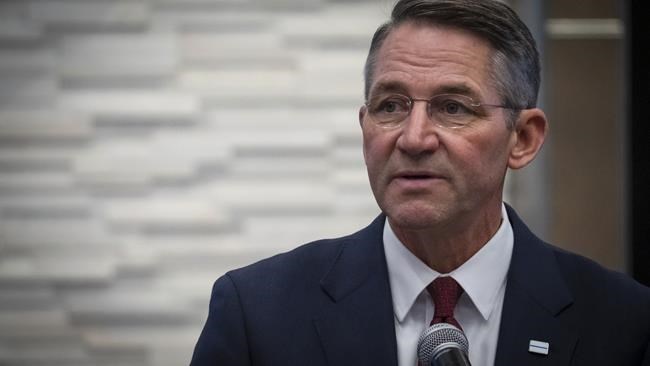
North Dakota Attorney General Drew Wrigley speaks during a news conference on Friday, July 21, 2023 in Fargo, N.D. The man who shot three Fargo police officers and a civilian, killing one of the officers before an officer killed him, searched the internet for terms including “explosive ammo” and “kill fast,” as well as for what crowded area events might be happening in and around North Dakota's largest city, authorities said Friday. ( KFGO via AP)
July 21, 2023 - 3:31 PM
Sitting in a parked car with an arsenal of weapons and ammunition, the man who fired on police officers in North Dakota earlier this month chose to use the one gun in his vehicle that was modified with a binary trigger. The device allowed the gun to fire so rapidly that it sounded like an automatic weapon.
The July 14 shooting in Fargo, which killed one officer and wounded two others and a civilian, has put a spotlight on the device and other trigger modifications that are a growing concern for law enforcement.
Mohamad Barakat, 37, opened fire on the officers as they responded to a car accident. He shot from his vehicle loaded with guns, a homemade grenade, gasoline canisters, propane tanks containing improvised explosives, and more than 1,800 rounds of ammunition, police said. Barakat was killed by a fourth officer who returned fire.
North Dakota Attorney General Drew Wrigley said on Friday that he believes the violence could have been the beginning of a bigger attack, as the Downtown Fargo Street Fair and the Red River Valley Fair were underway.
Wrigley noted that Barakat had four semi-automatic handguns and three semi-automatic rifles, but only one of them — the one he picked to go on his shooting rampage — had a binary trigger.
Here's a look at the device, regulations around binary triggers and how they differ from bump stocks:
WHAT ARE BINARY TRIGGERS?
A binary trigger is a modification that allows a weapon to fire one round when the trigger is pulled and another when it is released — in essence doubling the firing capacity, firearms experts and weapons manufacturers say.
The modifications are relatively inexpensive, running a few hundred dollars depending on the model. They are also a relatively new technology, first released in 2015 partly in response to federal regulators seeking to expand the scope of banning modifications that create automatic weapons.
WHAT REGULATIONS EXIST ON BINARY TRIGGERS?
They are legal in most states and at the federal level. Federal regulations don't yet cover the sale of binary trigger modifications, said Robert Spitzer, a professor at the College of William & Mary Law School whose research focuses on gun policy and politics.
“It’s a matter of technology outrunning regulation, which is not a new thing," Spitzer said.
Some states do ban the purchase of binary triggers specifically or modifications like binary triggers generally. The manufacturer websites note that they cannot sell them to civilians in 12 states, including California, New York, Florida and others or in Washington D.C. At least one other state not listed on the seller websites has a partial ban on similar modifications, firearm law experts said.
HOW DO BINARY TRIGGERS DIFFER FROM BUMP STOCKS?
Bump stocks are a frame or component added onto the back of semi-automatic weapons that allow them to fire like machine guns by using the recoil from an initial trigger pull to fire multiple rounds.
Under former President Donald Trump's administration, the Bureau of Alcohol, Tobacco, Firearms and Explosives moved to ban bump stocks after the 2017 mass shooting at a Las Vegas music festival where a gunman using bump stock-modified weapons killed 60 people. Federal regulators argued that bump stocks fell under 1934 and 1986 federal regulations on automatic weapons.
The ban survived multiple challenges around the country until January, when a U.S. Appeals Court in New Orleans ruled in favor of challengers who argued the federal regulations against machine guns don't specifically cover bump stocks.
The Bureau of Alcohol, Tobacco, Firearms and Explosives has also made moves to regulate what are called “forced reset triggers," saying they also created, in essence, machine guns out of semi-automatic weapons by adding a spring to a trigger, allowing it to reset and fire faster.
Greg Wallace, a professor at the Campbell University Norman Adrian Wiggins School of Law who has studied firearm laws, said binary triggers work on a completely different mechanism than forced reset triggers. He said binary triggers modify the component of the trigger that holds the hammer or striking mechanism back.
Wallace said he agreed with several articles that have called binary triggers a gimmick “having little, if any, practical real-world use.”
___
Associated Press writer Heather Hollingsworth in Mission, Kansas, contributed to this report.
News from © The Associated Press, 2023